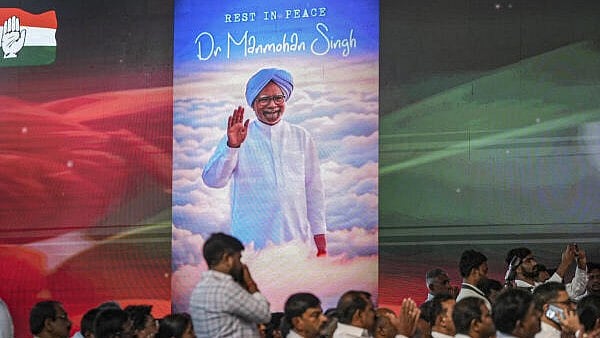
Congress workers during a condolence meeting for former prime minister Manmohan Singh, who passed away on Thursday, in Belagavi, Karnataka
Credit: PTI Photo
Former Prime Minister Manmohan Singh was one of the key architects of modern India, much like some of the tall leaders of the freedom movement who shaped the policies of the new republic and strove to build the new nation. He will be best known as the finance minister who set in motion the economic reforms, in 1991, which set India on a path of rapid development and gave the country a new profile.
He was, like the other nation-builders, a versatile personality with high intellectual accomplishments and varied interests; he held a range of offices and left his mark on each of them. Manmohan Singh was an academic, an economist, a bureaucrat, and above all, a man who held on to the highest values of life. Even when there was disagreement with him, he was agreeable – not a quality most politicians in our contentious times can be credited with.
He was among the Prime Ministers who had the longest tenures in office and among the few who were re-elected to the office. Being the first from a minority community to become the Prime Minister of the country may have been of symbolic value but such symbolism is potent in politics and does carry significance in democracies. He did not become the Prime Minister in the natural course of politics; his entry into the office was by accident, much like P V Narasimha Rao who made him his transformational finance minister.
Both proved that accidents are also opportunities for change, and guided the country in a new direction. During his term as finance minister, Manmohan Singh helped unleash animal spirits in the economy. He consolidated the gains of the economic revolution later, as the Prime Minister, and sought to give them a social underpinning and a human face. He was found wanting in his second term as Prime Minister – there is yet to be an accurate reckoning of that period marked by a combination of political and personal failures that also changed the course of governance.
There was a line of national destiny that ran through his life – it took him from a small village in Pakistan through the uncertainties of Partition to the highest official and political positions in India. He may have been the right man in the right place at the right time on many occasions, but doing right is not easy in these times.
He represented calmer and more decent times, less fraught and vitiated than now; he evoked grace and goodwill. He was a Nehruvian in spirit, with a modern, rational, and secular vision anchored in a saner world which is now fading. History will be kinder to him than he thought the media of his time was. Manmohan Singh will have a place in it as a great Prime Minister, a spot he earned.
